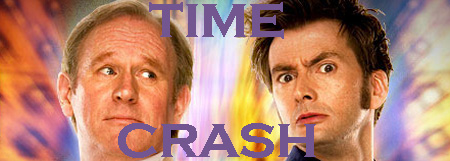
The end of the Universe. We’ve been here before, haven’t we?
There’s a sense of deja vu that permeates Utopia, and yet despite its location, its familiar director (who, it must be said, does a reliably excellent job here), a quarry and the loaned cast of Duran Duran’s Wild Boys video, the story as it stands is fine. Serviceable, in fact, because like many near end-of-term RTD scripts, it’s not so much a story as a vehicle for bigger things to come: this is a story light on plot but heavy on continuity. Who’d have thought that three years into the new series we’d be experiencing flashbacks to The Parting of the Ways?
Utopia is that kind of event – not so much a big build, but one that necessitates a good deal of rib-jogging to recall various institutions of the series, both new and old. Rose’s departure, the Doctor’s regeneration (not to mention his hand), Captain Jack, and of course the fob watch device that renders both the Doctor and his mortal foe human (is it always a watch? Why?) So in a way Utopia is like a trip back into the bad old days of Eighties Who, where inter-story continuity was a given even if it wasn’t necessary, and inter-season continuity was both a given and something to be accepted. What’s curious about all of this then, is that of all the old elements brought back and explained in the story, the Master isn’t one of them.
But, as I’ve been told by fellow fan, what is there to know about the Master anyway? That he’s a Time Lord – sure; that he’s bad, probably mad and definitely dangerous to know, patently. But what else? That he and the Doctor were once old friends? Probably not necessary. That he was once known as Magnus/Koschei? So not necessary. Maybe it’s the lack of foreshadowing in this episode and previous to it that offers the best surprise, as even fans who recognised ‘the sound of drums’ during Yana’s delirious episodes might not have imagined that he of all people could be, well, him.
And so to him indeed. We get two for the price of one – a feat unseen in another Time Lord since Destiny of the Daleks (and even that was a cheat). And he even regenerates – that’s technically a new trick for him. Of the two versions on show Derek Jacobi’s is less hammy and does both sides of Yana’s coin justice. His successor on the other hand… we-ell, maybe it’s too early to tell. If there’s one thing that this story has cleared up, it’s that of all the buttons routinely flicked and teased by the Doctor in his daily lap around the TARDIS console and also punched by the newly-regenerated Master, the big flashing one marked CAMP is sure to be among them. Despite this, or to more than a few fans because of this, the last ten minutes of Utopia are genuine rewind moments. But for its clever build-up (those barmy drums like a vast kitchen’s worth of rattling pot lids, Jacobi’s tears – there’s a mash-up just waiting to be made out there with your choice of earworm ditty overdubbed – The Macarena, perhaps?) the duality of Master No. Six’s regeneration with the Tenth Doctor’s come across as just a bit obsequious. Do we really need to be shown that they’re polar opposites, when they really aren’t? Are they really just the same soul with opposing raisons d’etre? If that’s RTD’s intention then it’s a disappointing follow-up to the questionable Doctor of The Family of Blood. But then, at the eleventh hour, maybe Davies felt it more important to reinforce the Doctor’s heroism with some good traditional murderous and guffawing villainy, and fair enough.
So a fun episode with some great performances and John Simm’s valiant final push Over. The. Top. at the end. A marvellous channeling of the late Tony Ainley, some might say, and on that note who couldn’t admit they loved the inclusion of not just Ainley’s but Delgado’s voices coming from Yana’s mysterious fob? A lovely tribute. And poor Chantho, eh? We just knew she was doomed as soon as she confessed her unspoken love for her scientific friend to Martha. The more things change…
PA









